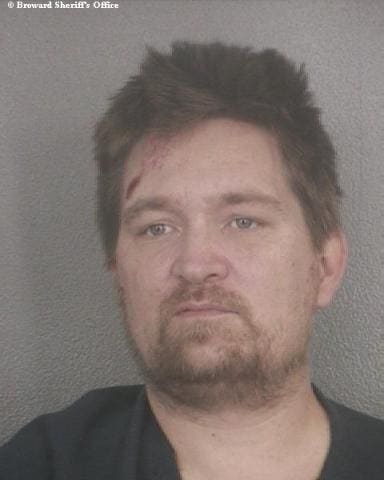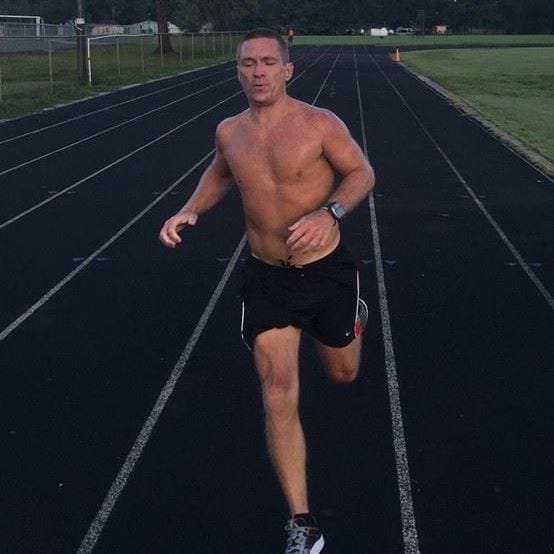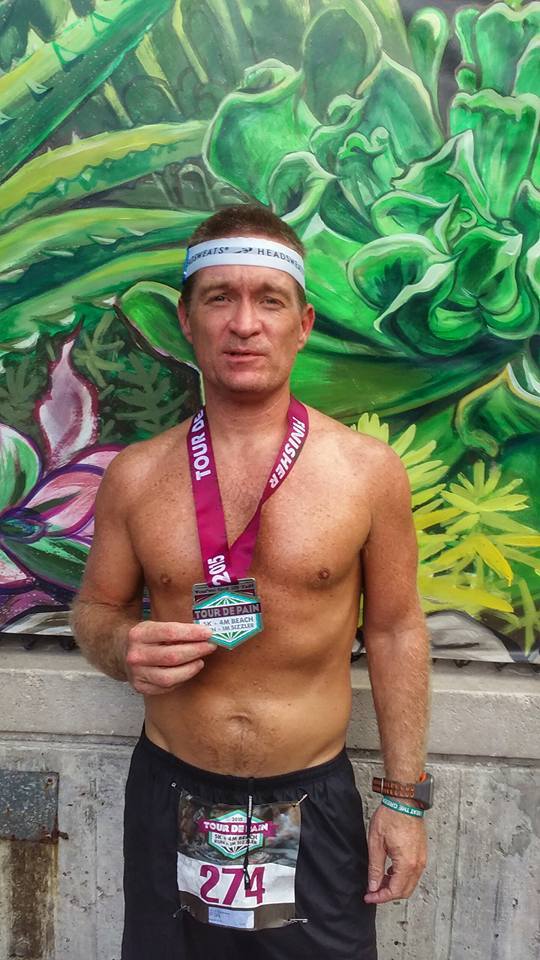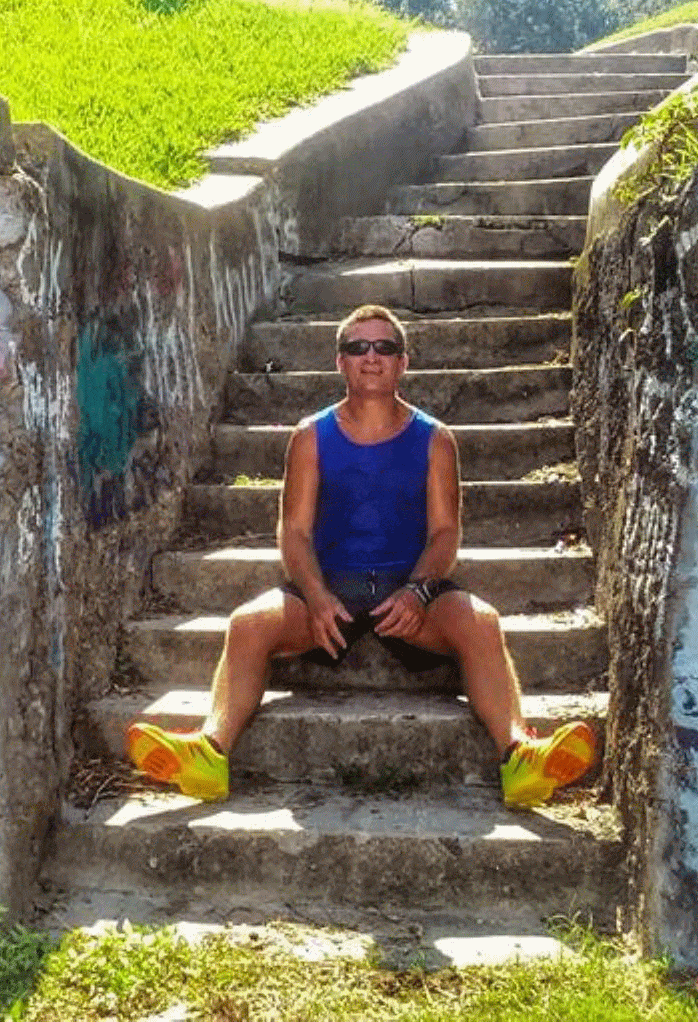Last January, Chad Moye glimpsed his past from the podium in Jacksonville’s Metropolitan Park, where he had won the Best Damn Race 5k. He had lived in this park for years, homeless and doing heroin—slept under that tree, bummed cigarettes over there, nodded out on that bench. Back then he had mocked the runners he saw on the park trails. “I used to laugh at those dorks in the short shorts and neon shoes,” he says. “If you would have told me then I would be a competitive distance runner one day, I would have thought you were the one on drugs.”
But that’s exactly what happened. The drugs dragged him to prison; running lifted him out. In the 15 months since his release, the 43-year-old Moye has run three dozen races, winning several and nearly always finishing in the top three of the masters division. His neon shoes have kept him clean and given him a new life. “Running has been my salvation,” he says.
Growing up, Moye had never been an athlete other than playing Pop Warner football. He preferred playing his guitar and smoking pot in high school and into community college. When his mom—who had been paying for and encouraging his education at Tallahassee (Florida) Community College—died from lung cancer in 1994, he dropped out, and moved to South Florida. He had dreams of becoming a musician but became an addict instead, hooked on Oxycontin and, eventually, heroin.
Over the next 20 years, he bounced in and out of jail and rehab. Five months in a Jamaican prison after he was caught smuggling pot back in 1998. Two months in a Florida county jail for heroin possession with intent to sell in 2006. That was his previous longest stretch of sobriety, in the court-ordered treatment program, but he got high the day he got out. Another bust in 2010 with a sentence of house arrest for possession with intent to sell Oxy.
He bounced around Florida, too, working odd jobs, playing music and selling drugs. For a stretch, he lived with his aunt in Jacksonville. When she reached her limit with his drug use and kicked him out, he landed in Metropolitan Park. His family had given up on him as an irreversible junkie. Certified as indigent, he collected free drugs at the hospital around the corner. “I was rock bottom,” he says. “It doesn’t get much worse than that right there.”
Until it did, when he sold Oxycontin to a cop in a Jacksonville trailer park and the judge sent him to Holmes Correctional Institution in Bonifay, Florida (90 miles west of Tallahassee), on May 8, 2012, for 28 months. His hope withered.

If he got busted again—which seemed very, very likely—he would spend the rest of his life in a place like this. He saw guys getting even more messed up buying into the prison’s “gang-banging culture” and thought, Nuh-uh, not for me.
He was attracted instead to a small group of guys who looked healthy working out on the track in the rec yard. After a few months inside, he asked if he could join them. Yeah, sure, they said.
Moye couldn’t make it around the quarter-mile track without stopping to puke. Two decades of using drugs and smoking a pack a day had kicked his ass. He was 30 pounds overweight and grossly out of shape. But the running guys dragged him out to the track the next day, and he managed to jog a full lap.
He stuck with it. His dad, the only one who seemed to still believe in him, bought him a pair of running shoes at the canteen. But it was rough. He was still going through withdrawal. His body resisted. Then there were days when the Panhandle wind whipped across the rec yard, days Moye was one of only two guys circling the track in the cold. But he was determined to lose weight and get in shape.
He ran every day: three, four miles in the half hour of allotted rec time. He did pull-ups, dips, sit-ups, crunches. With time, the running got easier. He dropped some pounds, felt fitter, and even enjoyed his time on the track. He began to see possibilities beyond the prison walls. To his list of things to do when he got out–see “American Hustle,” eat crab legs and fried shrimp–he added, run a 5k.

At first, Moye couldn’t make it around the track without feeling sick. Courtesy Chad Moye
He left prison on July 1, 2014. Two and a half months later, he ran his first 5k. He finished with a decent time, under 22 minutes, but wasn’t satisfied. He thought he could do better. So he ran another race the next weekend and did. He was hooked—on the competition as much as the environment. “I loved the camaraderie, the people cheering others across the finish line, the whole energy of it—I’d never experienced anything like that,” he says.
After that first race, Moye got down on his knees and vowed to quit smoking, to give up that last hurdle to his health. He hasn’t had a cigarette since.
Moye, who now lives in Brunswick, Georgia, entered the Holmes prison high on Oxy, but running has kept him clean for over three years now. He’s found a new freedom within the discipline and rigor of training and racing. “Running has become the center of all things positive in my life,” he says. “My blueprint for sobriety has been adopting a healthy lifestyle and putting goals in front of me.”
He credits his time locked up with setting him on this path. “Prison did that,” he says. “I’m so glad it happened, or I never would’ve gotten clean. That was the intervention I needed.”
Trading his drug addiction for running, Moye tapped an unknown talent. He has collected more than 40 medals, ribbons, and trophies over the past year. His personal best is a 19:40 5k, and he’s intent on getting better. He’s training for the Jacksonville Marine Corps half marathon, his first race of that distance, on October 3, and the LA Marathon on February 14, 2016.
Kim Pawelek Brantly, a national marathon champion, has coached Moye casually and thinks he could break marathoning’s golden mark of three hours, and improve his times at other distances as well. “He’s almost got a superhuman body, considering what he’s done to it,” she says. “It’s wonderful to see him develop as quickly as he has. He’s going to be able to go really far.”
Moye has also won friends within the running community, rewarded with camaraderie and a sense of belonging. When he’s not racing on weekends, he runs with the Brunswick Fasties, a selective group of 22 serious runners who invited him to join them in January. He also trains with members of the group during the week. “Those are my meetings,” he says.
The group learned his story over the months. “He opened up on runs about his past,” says Annette Williams, founder of the Brunswick Fasties. “He didn’t lead with it, but he never hid from it.”
Rather than being frightened off, the members were drawn toward his humility, his sense of humor, and his enthusiasm for running. Moye, in turn, appreciated their acceptance and support. “They have been so accepting and a positive influence,” he says.

Today, Chad Moye is winning races and training for his first marathon. Courtesy Chad Moye
Not long ago, Moye received a call from Michael Martinez, a recovering addict and marathon runner himself, after Moye had posted his story on a Facebook running group page. Martinez is an ambassador for Runwell, which promotes running among recovering addicts. He invited Moye to join him for a walk/run Runwell leads at Gateway Community Services, an alcohol and drug treatment center in Jacksonville. Moye readily accepted and became a regular. Every Tuesday for the past three months, he has made the hour-long drive to join the patients on their weekly run. “I appreciate him stepping up,” Martinez says. “He’s made a commitment and stuck with it. He’s giving back to the running community and helping others.”
The homeless heroin addict turned competitive runner has instant street cred with this group. They want what he has, and he’s happy to give it to them. Yet it’s hard to tell who’s getting more out of it, Moye or guys like Patrick, a 24-year-old who is five months removed from his crack habit and now eager to run at Moye’s side. “I’m just trying to give others some hope,” Moye says. “I’m able to pay it forward one mile at a time and enjoy their journeys while forwarding my own.”
He has certainly come a long way in a short time, a fact abundantly clear to him when he stood on that podium in Metropolitan Park earlier this year. “I don’t know where my life would be right now if I hadn’t discovered running,” he says. “But I know I don’t want to be under that tree ever again.”
© John Rosengren
